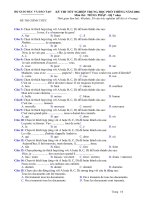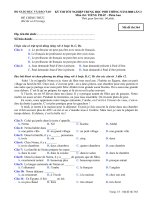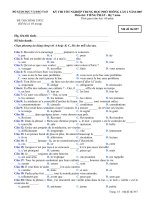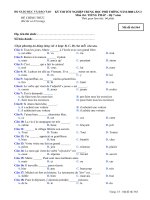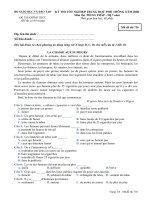- Trang chủ >>
- Đề thi >>
- Đề thi lớp 2
Đề thi tốt nghiệp THPT Quốc Gia môn Tiếng Anh hệ 7 năm 2006-2007 lần 2 mã đề 367 - Học Toàn Tập
Bạn đang xem bản rút gọn của tài liệu. Xem và tải ngay bản đầy đủ của tài liệu tại đây (171.09 KB, 3 trang )
<span class='text_page_counter'>(1)</span><div class='page_container' data-page=1>
Trang 1/3 - Mã đề thi 367
<b>BỘ GIÁO DỤC VÀ ĐÀO TẠO </b>
ĐỀ THI CHÍNH THỨC
<i>(Đề thi có 03 trang)</i>
<b>KỲ THI TỐT NGHIỆP TRUNG HỌC PHỔ THÔNG LẦN 2 NĂM 2007 </b>
<b>Môn thi: TIẾNG ANH - Hệ 7 năm </b>
<i>Thời gian làm bài: 60 phút. </i>
<b>Mã đề thi 367 </b>
<b>Họ, tên thí sinh</b>:...
..
<b>Số báo danh</b>:...
.
<i><b>Ch</b><b>ọ</b><b>n t</b><b>ừ</b><b>/c</b><b>ụ</b><b>m t</b><b>ừ</b><b> thích h</b><b>ợ</b><b>p (</b><b>ứ</b><b>ng v</b><b>ớ</b><b>i A ho</b><b>ặ</b><b>c B, C, D) </b><b>để</b><b> hoàn thành m</b><b>ỗ</b><b>i câu sau.</b></i>
<b>Câu 1: Brenda: "Do you think it will rain?" </b>
Carol: "Oh!______."
<b>A. </b>I hope not <b>B. </b>I don't hope so <b>C. </b>I don’t hope <b>D. </b>It’s hopeless
<b>Câu 2: I don’t mind _____ you with it if you can’t find anyone else. </b>
<b>A. </b>help <b>B. </b>helped <b>C. </b>to help <b>D. </b>helping
<b>Câu 3: The Second World War _____ in 1939. </b>
<b>A. </b>has started <b>B. </b>starts <b>C. </b>start <b>D. </b>started
<b>Câu 4: That's the house _____ he used to stay. </b>
<b>A. </b>of which <b>B. </b>on which <b>C. </b>in which <b>D. </b>which
<b>Câu 5: Mary ______ in London for 15 years. </b>
<b>A. </b>was living <b>B. </b>lives <b>C. </b>is living <b>D. </b>has lived
<b>Câu 6: Many Vietnamese people are fond _____ watching football. </b>
<b>A. </b>in <b>B. </b>about <b>C. </b>of <b>D. </b>with
<b>Câu 7: My sister had a baby girl yesterday, and this is my first ______. </b>
<b>A. </b>daughter <b>B. </b>son <b>C. </b>niece <b>D. </b>nephew
<b>Câu 8: We are not used _____ on the left. </b>
<b>A. </b>driving <b>B. </b>to driving <b>C. </b>to be driven <b>D. </b>to drive
<b>Câu 9: Peter ______ at the moment, so he can't answer the telephone. </b>
<b>A. </b>works <b>B. </b>worked <b>C. </b>is working <b>D. </b>has worked
<b>Câu 10: There is _____ water in the bottle. </b>
<b>A. </b>a little <b>B. </b>a number of <b>C. </b>few <b>D. </b>many
<b>Câu 11: There are _____ planets in the universe that we cannot count them. </b>
<b>A. </b>such <b>B. </b>so many <b>C. </b>so <b>D. </b>so much
<b>Câu 12: Dora: “What’s your name?” </b>
Helen: “______”
<b>A. </b>OK. <b>B. </b>Forgive me. <b>C. </b>Really? <b>D. </b>Pardon?
<b>Câu 13: The house caught fire while they _____. </b>
<b>A. </b>have slept <b>B. </b>were sleeping <b>C. </b>sleep <b>D. </b>are sleeping
<b>Câu 14: We agreed _____ Mr. Wilson was a good teacher. </b>
<b>A. </b>that <b>B. </b>what <b>C. </b>which <b>D. </b>if
<b>Câu 15: Don't read that book. It's _____. </b>
<b>A. </b>boring <b>B. </b>bore <b>C. </b>bored <b>D. </b>boredom
<b>Câu 16: He was looking for an eraser _____ he could erase a mistake in his composition. </b>
<b>A. </b>however <b>B. </b>therefore <b>C. </b>because <b>D. </b>so that
<b>Câu 17: The animals gathered closely together for ______. </b>
<b>A. </b>warm <b>B. </b>warmth <b>C. </b>warmed <b>D. </b>warmly
<b>Câu 18: Could you ______ me how to use this new mobile phone? </b>
<b>A. </b>say <b>B. </b>show <b>C. </b>direct <b>D. </b>explain
<b>Câu 19: Yesterday was the day ______ they celebrated their 21st wedding anniversary. </b>
<b>A. </b>which <b>B. </b>then <b>C. </b>what <b>D. </b>when
<b>Câu 20: In our school library, there are several large tables _____ we can sit to read books. </b>
</div>
<span class='text_page_counter'>(2)</span><div class='page_container' data-page=2>
Trang 2/3 - Mã đề thi 367
<b>Câu 21: This house, _____ he bought in 1990, is being repaired at the moment. </b>
<b>A. </b>who <b>B. </b>which <b>C. </b>what <b>D. </b>that
<b>Câu 22: If I _____ ten years younger, I would do yoga everyday. </b>
<b>A. </b>have been <b>B. </b>were <b>C. </b>are <b>D. </b>am
<b>Câu 23: French _____ in Quebec, Canada. </b>
<b>A. </b>is spoken <b>B. </b>has spoken <b>C. </b>speaks <b>D. </b>is speaking
<b>Câu 24: The librarian told us not _______ reference books out of the library. </b>
<b>A. </b>to take <b>B. </b>taking <b>C. </b>take <b>D. </b>took
<b>Câu 25: Thank you for _____ me. </b>
<b>A. </b>invited <b>B. </b>inviting <b>C. </b>invitation <b>D. </b>invite
<i><b>Ch</b><b>ọ</b><b>n t</b><b>ừ</b><b> (</b><b>ứ</b><b>ng v</b><b>ớ</b><b>i A ho</b><b>ặ</b><b>c B, C, D) có ph</b><b>ầ</b><b>n g</b><b>ạ</b><b>ch chân </b><b>đượ</b><b>c phát âm khác v</b><b>ớ</b><b>i nh</b><b>ữ</b><b>ng t</b><b>ừ</b><b> còn l</b><b>ạ</b><b>i </b></i>
<i><b>trong m</b><b>ỗ</b><b>i câu sau. </b></i>
<b>Câu 26: A. </b>teach <b>B. </b>beach <b>C. </b>heat <b>D. </b>breath
<b>Câu 27: A. </b>done <b>B. </b>none <b>C. </b>bone <b>D. </b>tongue
<b>Câu 28: A. </b>moon <b>B. </b>food <b>C. </b>good <b>D. </b>noodle
<b>Câu 29: A. </b>grapes <b>B. </b>hats <b>C. </b>chairs <b>D. </b>roofs
<b>Câu 30: A. </b>worked <b>B. </b>caused <b>C. </b>forced <b>D. </b>stopped
<i><b>Xác </b><b>đị</b><b>nh t</b><b>ừ</b><b>/c</b><b>ụ</b><b>m t</b><b>ừ</b><b> có g</b><b>ạ</b><b>ch d</b><b>ướ</b><b>i (</b><b>ứ</b><b>ng v</b><b>ớ</b><b>i A ho</b><b>ặ</b><b>c B, C, D) c</b><b>ầ</b><b>n ph</b><b>ả</b><b>i s</b><b>ử</b><b>a </b><b>để</b><b> nh</b><b>ữ</b><b>ng câu sau tr</b><b>ở</b></i>
<i><b>thành chính xác.</b></i>
<b>Câu 31: How age is your elder sister? </b>
A B C D
<b>Câu 32: Last summer my family went camp in Do Son. </b>
A B C D
<b>Câu 33: The room is such dirty that it needs cleaning immediately. </b>
A B C D
<b>Câu 34: Have you finished reading the book which I lend you last week? </b>
A B C D
<b>Câu 35: Marie Curie, whose discover of radium made her famous, was a French physicist. </b>
A B C D
<i><b>Đọ</b><b>c k</b><b>ỹ</b><b>đ</b><b>o</b><b>ạ</b><b>n v</b><b>ă</b><b>n sau và ch</b><b>ọ</b><b>n ph</b><b>ươ</b><b>ng án </b><b>đ</b><b>úng (</b><b>ứ</b><b>ng v</b><b>ớ</b><b>i A ho</b><b>ặ</b><b>c B, C, D) cho m</b><b>ỗ</b><b>i câu t</b><b>ừ</b><b> 36 </b><b>đế</b><b>n </b></i>
<i><b>40. </b></i>
Out in the Pacific Ocean, 3,700 kilometres from Los Angeles, are the islands of Hawaii, the fiftieth
state of the United States, with its area of 16,700 square kilometres.
The first Hawaiians arrived from other Pacific islands sometime around 100 A.D. Then in 1778,
Captain Cook visited Hawaii. He put the islands on his maps of the Pacific Ocean. Then more ships
knew Hawaii and began stopping there for supplies.
In 1820, a small group of people from the eastern United States came to teach the Hawaiian people
about Christianity. They started farms to grow sugar cane and pineapples. Because there were not
enough people to do all the farm work, farm owners brought in Asians – Chinese, Japanese, and
Filipinos. Later Koreans, Portuguese, and Puerto Ricans also came. More people came from the U.S.
mainland and from other Pacific islands, and Hawaii became an island with traditions from several
countries. People from the various national groups have married each other, so today the groups are
partly mixed.
Hawaiians are very friendly and always welcome visitors. They celebrate traditional Chinese,
Japanese, and Filipino holidays as well as holidays from the United States. Hawaii is known as the
Aloha State. “Aloha” means “hello”, “goodbye”, and “I love you” in Hawaiian.
<b>Câu 36: Hawaii is _______ square kilometres in area. </b>
</div>
<span class='text_page_counter'>(3)</span><div class='page_container' data-page=3>
Trang 3/3 - Mã đề thi 367
<b>Câu 37: More ships knew Hawaii through _______ and stopped there for supplies. </b>
<b>A. </b>Japanese visitors <b>B. </b>Christopher Columbus
<b>C. </b>Captain Cook’s maps <b>D. </b>Christians
<b>Câu 38: In the early 19th century, many Asians were taken to Hawaii _______. </b>
<b>A. </b>to go fishing <b>B. </b>to be holidaymakers
<b>C. </b>to visit attractions <b>D. </b>to do the farm work
<b>Câu 39: Today the various national groups are _______. </b>
<b>A. </b>completely mixed <b>B. </b>living in different societies
<b>C. </b>partly mixed <b>D. </b>completely separated
<b>Câu 40: According to the passage, which of the following statements is NOT true? </b>
<b>A. </b>Captain Cook came to Hawaii in 1778.
<b>B. </b>All Hawaiian people have come from Asia.
<b>C. </b>Hawaii is the fiftieth state of the United States.
<b>D. </b>Hawaii is in the Pacific Ocean, 3,700 kilometres from Los Angeles.
<i><b>Đọ</b><b>c k</b><b>ỹ</b><b>đ</b><b>o</b><b>ạ</b><b>n v</b><b>ă</b><b>n sau và ch</b><b>ọ</b><b>n ph</b><b>ươ</b><b>ng án </b><b>đ</b><b>úng (</b><b>ứ</b><b>ng v</b><b>ớ</b><b>i A ho</b><b>ặ</b><b>c B, C, D) cho m</b><b>ỗ</b><b>i ch</b><b>ỗ</b><b> tr</b><b>ố</b><b>ng t</b><b>ừ</b><b> 41 </b></i>
<i><b>đế</b><b>n 45. </b></i>
Ann Johnson has worked at this college for three years. She is a responsible employee and gets on
well with the other members of the department. We have all found her to be an excellent (41)______.
She is always on time for work. She is an extremely (42)______ staff member who is able to work
independently. I can always rely on her creative thinking. Her students often tell me how kind she is.
She is always ready to help with a smile and she is cheerful to all of them. In private, she is not very
talkative (43)______ seems rather shy. Her work is excellent, and she is determined to (44)______.
She is also quite ambitious and has applied for the position of Director of Studies. I think that you can
count (45)______ Ann to make your school a success and I recommend her for the post of Director.
<b>Câu 41: A. </b>employer <b>B. </b>student <b>C. </b>adult <b>D. </b>colleague
<b>Câu 42: A. </b>selfish <b>B. </b>lazy <b>C. </b>reliable <b>D. </b>stubborn
<b>Câu 43: A. </b>and <b>B. </b>as <b>C. </b>so <b>D. </b>therefore
<b>Câu 44: A. </b>help <b>B. </b>succeed <b>C. </b>fail <b>D. </b>use
<b>Câu 45: A. </b>with <b>B. </b>to <b>C. </b>for <b>D. </b>on
<i><b>Ch</b><b>ọ</b><b>n ph</b><b>ươ</b><b>ng án </b><b>đ</b><b>úng (</b><b>ứ</b><b>ng v</b><b>ớ</b><b>i A ho</b><b>ặ</b><b>c B, C, D) </b><b>để</b><b> hoàn thành m</b><b>ỗ</b><b>i câu sau. </b></i>
<b>Câu 46: Although the sun was shining, ______. </b>
<b>A. </b>but it was very hot <b>B. </b>it was very hot <b>C. </b>it wasn’t very hot <b>D. </b>yet it was very hot
<b>Câu 47: He walked slowly _____. </b>
<b>A. </b>because of his bad leg <b>B. </b>in his bad leg
<b>C. </b>so his leg was bad <b>D. </b>so that his leg was bad
<b>Câu 48: They took the robber to the police station ______. </b>
<b>A. </b>quickly as possible <b>B. </b>as quickly as they could
<b>C. </b>so quick as they were <b>D. </b>very quick as possible
<b>Câu 49: Do you know when _____? </b>
<b>A. </b>did the accident happen <b>B. </b>was the accident happening
<b>C. </b>the accident was happening <b>D. </b>the accident happened
<b>Câu 50: _____ your relatives in England? </b>
<b>A. </b>How often do you visit <b>B. </b>What do you often visit
<b>C. </b>How often you visit <b>D. </b>What often you visit
---
</div>
<!--links-->
